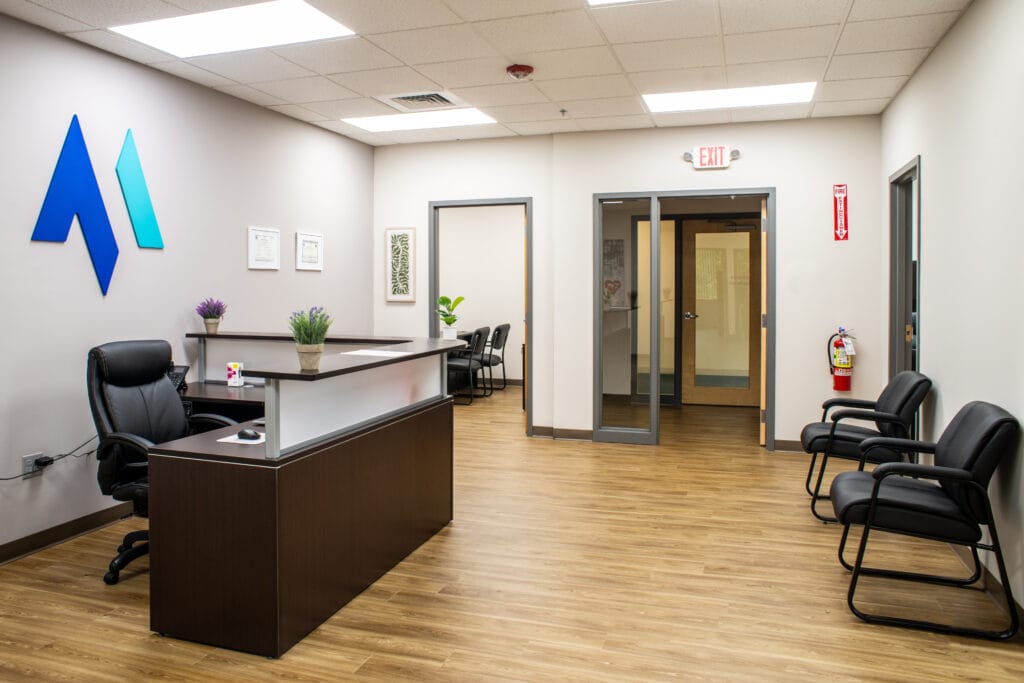(844) 909 2560
Available 24x7, Toll-Free
Although initially developed for medical purposes, amphetamines are commonly prescribed to treat conditions like attention deficit hyperactivity disorder (ADHD) and narcolepsy. However, due to their stimulating and euphoric effects, they are often misused, leading to serious health complications and the potential for addiction.
At Meta Addiction Treatment, we offer compassionate amphetamine addiction treatment. Read on to learn more about amphetamine addiction, as well as our approach to treating it.
Amphetamine addiction can develop after prolonged or high-dose use, resulting in both physical and psychological dependence. Those struggling with addiction may experience intense cravings, uncontrollable drug-seeking behavior, mood instability, anxiety, paranoia, and, in severe cases, psychosis.
Chronic abuse of amphetamines can cause lasting damage, including cardiovascular problems, impaired cognitive function, and emotional instability. Many individuals misuse these drugs to enhance performance, aid in weight loss, or for recreational highs—further increasing the risk of dependence and long-term harm.
Common Prescription Amphetamines
Several widely used medications contain amphetamines or related stimulants:
Adderall: A combination of amphetamine and dextroamphetamine, Adderall is prescribed for ADHD and works by increasing brain chemicals that enhance focus, concentration, and behavioral control.
Dexedrine: Similar in function to Adderall, Dexedrine helps manage hyperactivity and attention issues by stimulating the central nervous system.
Ritalin: This stimulant works differently in adults and children. In adults, it helps manage impulsivity and attention difficulties by stimulating the brain. In children, it can have a calming effect.
Concerta: A longer-acting form of methylphenidate, Concerta is often used as an alternative to Adderall, offering extended symptom control throughout the day.
Using these medications without a prescription, or misusing them for studying, weight loss, or recreational purposes, can lead to addiction, overdose, and severe health risks.
Illicit Use of Amphetamines
Amphetamines are also found in various illegal drugs, including:
Methamphetamine: Commonly known in its crystal form as "crystal meth," methamphetamine also exists as a powder (“speed”) and a sticky paste (“base”).
Ecstasy (MDMA): A derivative of amphetamine, MDMA provides stimulant effects such as increased energy, euphoria, and heightened sociability. However, many ecstasy pills contain only small amounts of MDMA, often mimicking the effects of amphetamines.
Recreationally, amphetamines are often referred to by street names such as “Whiz,” “Goey,” “Pep Pills,” or “Uppers.”

Amphetamine addiction can have far-reaching and devastating effects on a person’s overall well-being, influencing not only physical health but also mental, emotional, and social stability. While these stimulants are sometimes prescribed for legitimate medical reasons, long-term misuse or abuse can lead to severe consequences that disrupt nearly every aspect of a person’s life.
From serious medical complications to emotional turmoil and fractured relationships, the effects of amphetamine addiction are both profound and difficult to reverse.
Chronic amphetamine use takes a significant toll on the body. One of the most immediate dangers is the increased risk of cardiovascular problems, including high blood pressure, irregular heartbeat, heart attacks, and strokes. Because amphetamines overstimulate the nervous and cardiovascular systems, long-term use can result in life-threatening heart conditions.
The drugs also suppress appetite, leading to extreme weight loss, malnutrition, dehydration, and a weakened immune system—making the body more susceptible to infections and other illnesses. Over time, organs like the brain, liver, and kidneys may suffer permanent damage.
Frequent users often experience “meth mouth,” a severe dental condition caused by dry mouth, poor hygiene, and tooth grinding, resulting in rapid tooth decay. Sleep deprivation is another common issue, as amphetamines can keep users awake for extended periods. This leads to exhaustion, hallucinations, impaired thinking, and eventually, serious cognitive decline. In extreme cases, users may suffer seizures or irreversible organ damage.
Withdrawal symptoms such as fatigue, muscle pain, cravings, and headaches make quitting difficult and painful, further fueling the cycle of addiction.
Amphetamines deeply affect mental health, often triggering lasting psychological issues. Users may face intense mood swings, anxiety, paranoia, and difficulty managing emotions. These drugs flood the brain with dopamine, creating a false sense of pleasure and euphoria. Over time, the brain becomes dependent on the drug to feel any sense of reward, leading to depression and emotional numbness when not using.
Many individuals struggling with amphetamine addiction also experience irritability, aggression, and impulsive behavior—sometimes resulting in violence or self-harm. Cognitive functions such as memory, concentration, and decision-making may decline, and in more severe cases, users can develop amphetamine-induced psychosis. This condition causes hallucinations, delusions, and a break from reality that may continue even after stopping drug use, requiring professional psychiatric care.
The emotional burden of addiction often leads to hopelessness, self-loathing, and suicidal thoughts, creating a destructive cycle that’s hard to escape.
The social consequences of amphetamine addiction are equally damaging. Relationships with family, friends, and coworkers often deteriorate due to erratic behavior, dishonesty, and mood instability. As addiction worsens, individuals may become isolated, withdrawing from loved ones and prioritizing drug use over personal or professional responsibilities.
Trust is frequently broken, as addicts may lie, steal, or manipulate others to maintain their habit. This behavior often results in broken relationships, emotional pain for those close to the addict, and deepening isolation.
Financial instability is another common outcome. Many addicts struggle to hold a job due to declining health, frequent absences, or poor performance. Some may turn to criminal activities such as theft or drug dealing to support their addiction, increasing their risk of legal issues, incarceration, and further social stigma.
Homelessness is also a potential consequence, driven by job loss, mounting debt, and estrangement from support systems. The stigma surrounding addiction makes recovery and reintegration even more challenging, leaving individuals feeling trapped and hopeless.
Ultimately, amphetamine addiction doesn't just harm the individual—it sends shockwaves through their personal, professional, and community relationships, leaving a trail of damage that can take years to repair.
Identifying amphetamine addiction can be challenging, particularly in its early stages when the individual may still appear functional. However, as dependence increases, more evident physical, behavioral, and psychological symptoms begin to surface. These signs can affect nearly every area of a person’s life, from their health and emotions to daily routines and social relationships. Early recognition is key to preventing long-term harm and increasing the chances of successful treatment.
Amphetamine abuse puts significant stress on the body, often resulting in a range of visible physical symptoms. Because these stimulants accelerate bodily functions, prolonged use can lead to serious, sometimes life-threatening health complications.
Severe weight loss – Appetite suppression leads to dramatic weight loss, malnutrition, and a gaunt appearance.
Dilated pupils – Enlarged pupils that remain even in bright light are a common indicator of stimulant use.
Irregular heartbeat – Users may experience a rapid or uneven heart rate, chest pain, or palpitations.
Excessive sweating – Increased body temperature can cause profuse sweating, even in cool environments.
Skin issues – Sores, acne, or lesions may develop, often due to repetitive scratching or hallucinations (e.g., the sensation of bugs crawling on the skin).
Tremors or muscle twitching – Involuntary shaking or spasms are signs of overstimulation.
Sleep disturbances – Chronic insomnia or disrupted sleep cycles are common among users.
Dental problems (“meth mouth”) – Decaying, broken, or missing teeth can result from dry mouth, poor hygiene, and teeth grinding.
Frequent nosebleeds or nasal damage – Snorting amphetamines can harm the nasal passages, leading to bleeding and congestion.
Neglected hygiene – Personal grooming and self-care often decline as addiction worsens.
Behavioral changes are often among the first noticeable signs of amphetamine abuse. These shifts are driven by the drug’s impact on the brain and can drastically alter how a person acts and interacts with others.
Hyperactivity and excess energy – Users may seem overly energetic, talkative, or restless, often staying active for days at a time.
Compulsive drug-seeking – Time and resources may be obsessively devoted to obtaining and using amphetamines.
Neglected responsibilities – Work, school, and family duties may be ignored or forgotten.
Secretive behavior – Lying about whereabouts, hiding drug use, or manipulating others to support the habit becomes common.
New peer groups – Addicts may distance themselves from old friends and spend time with other users.
Risky decisions – Impulsive or dangerous actions, such as reckless driving, unprotected sex, or criminal activity, increase.
Aggression and irritability – Users may lash out or become violent without warning.
Crash-and-binge cycles – Periods of intense activity are often followed by extreme fatigue and prolonged sleep.
Loss of interest in hobbies – Activities that once brought joy are often abandoned.
Financial struggles – Money issues arise from drug purchases, job loss, or theft.
Amphetamines profoundly alter brain chemistry, leading to a host of emotional and cognitive challenges. With continued use, these psychological symptoms often intensify and may require professional treatment.
Severe mood swings – Emotions may shift rapidly between euphoria, agitation, anxiety, and depression.
Paranoia and delusional thinking – Addicts may believe others are watching or plotting against them.
Hallucinations – Sensory experiences, such as seeing or feeling things that aren’t real, may occur.
Intense anxiety or panic attacks – Fear and panic may arise without cause or warning.
Depression and suicidal thoughts – As natural dopamine production declines, feelings of hopelessness and despair often set in.
Memory problems and confusion – Thinking clearly becomes difficult, and memory lapses are frequent.
Obsessive or repetitive behaviors – Individuals may become fixated on tasks like cleaning or organizing.
Emotional numbness – An inability to feel or express emotions may lead to social withdrawal.
Psychosis – Long-term abuse can cause breaks from reality, including delusions and hallucinations that mimic schizophrenia.
Lack of motivation – Reduced dopamine levels may result in apathy, fatigue, and a lack of interest in life.

Recovering from amphetamine addiction involves more than just quitting the drug—it requires a holistic treatment plan that addresses both the physical effects and the psychological grip of the addiction. Since amphetamines drastically alter brain chemistry, the road to recovery can be difficult, but with the right support and strategies, individuals can regain control of their lives. A successful treatment plan typically includes detoxification, therapy, medication support (when needed), and ongoing recovery resources.
Detoxification is the process of clearing amphetamines from the body. This stage can be challenging due to uncomfortable withdrawal symptoms, so medical supervision is often recommended for safety and support.
Medical Monitoring: Healthcare professionals track vital signs and manage symptoms like anxiety, insomnia, and intense cravings.
Tapering Off: In some cases, gradually reducing the drug dosage rather than stopping abruptly can ease the severity of withdrawal.
Nutritional and Hydration Support: Rebuilding the body’s strength with proper nutrition and hydration is vital after the physical toll of drug abuse.
Rest and Recovery: Restoring regular sleep patterns and allowing the body time to heal are crucial for a healthy recovery foundation.
Therapy is at the heart of amphetamine addiction treatment. It helps individuals identify the root causes of their substance use, develop healthier thought patterns, and build coping mechanisms for stress and cravings.
Cognitive-Behavioral Therapy (CBT): Helps patients recognize and change the negative thought patterns and behaviors associated with drug use.
Contingency Management (CM): Provides positive reinforcement through rewards or incentives for maintaining sobriety.
Motivational Interviewing (MI): Encourages self-confidence and strengthens an individual’s commitment to recovery.
Family and Group Therapy: Rebuilds trust and communication with loved ones while offering the support and accountability of peers facing similar struggles.
Individual Therapy: Offers a safe space to explore trauma, mental health issues, and emotional challenges tied to addiction.
Sustaining recovery requires long-term strategies that promote resilience and help prevent relapse. This includes building support networks, changing daily habits, and developing healthy ways to manage life’s stressors.
Community support can be a vital component of staying sober. Sharing experiences and learning from others helps reduce isolation and reinforces the motivation to stay clean.
Narcotics Anonymous (NA): A 12-step program offering peer support, accountability, and structured recovery steps rooted in spiritual growth and personal responsibility.
Non-12-Step Groups: Programs like SMART Recovery, and LifeRing, offer science-based recovery methods without a religious or spiritual focus.
Peer Support Benefits: Connecting with others in recovery helps individuals feel understood, supported, and empowered to overcome setbacks.
To maintain long-term recovery, individuals must create a balanced, fulfilling lifestyle that supports both mental and physical well-being.
Healthy Routines: Establishing structure through daily routines, regular sleep, physical activity, and balanced meals promotes stability and reduces the temptation to relapse.
Exercise and Nutrition: Exercise boosts mood and reduces cravings by releasing endorphins. Proper nutrition helps repair damage caused by substance use.
Managing Stress: Learning healthy ways to cope with stress—such as meditation, yoga, journaling, or creative hobbies—can prevent relapse triggers.
Avoiding High-Risk Situations: Steering clear of environments, people, or situations associated with past drug use is essential for relapse prevention.
Although recovery from amphetamine addiction can be demanding, it is absolutely achievable. With a combination of medical care, therapy, peer support, and healthy lifestyle adjustments, individuals can rebuild their lives. Seeking professional help early greatly improves the chances of long-term success. Recovery is not just about breaking free from the drug—it’s about creating a new, healthier way of living.

If you or a loved one needs help with an amphetamine addiction, call us today at 844-909-2560, or email us at info@metaaddictiontreatment.com. You can also visit any one of our three locations, which are open 24/7:
Our flexible outpatient programs can help individuals live the sober life they want and deserve. Best of all, our programs allow individuals to progress in their recovery while still going to work, attending school, or taking care of their family. We understand that recovery must be effective both inside and outside treatment programs and we work hard to help our clients apply the lessons learned in treatment to their everyday lives. For individuals who need sustained support while fulfilling life responsibilities, outpatient treatment with Meta can be an ideal fit.
If you’re not sure whether outpatient treatment is appropriate for you or your loved one, consider taking our assessments.
Don't wait to get help. Contact us to start a journey towards recovery today.